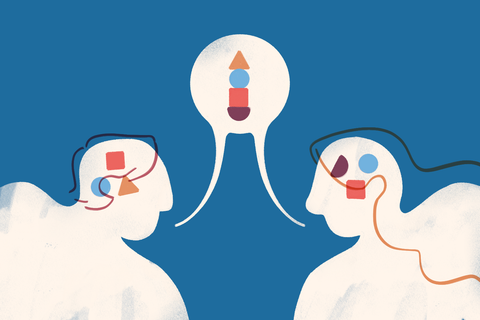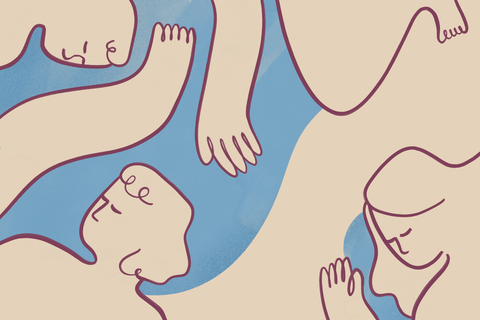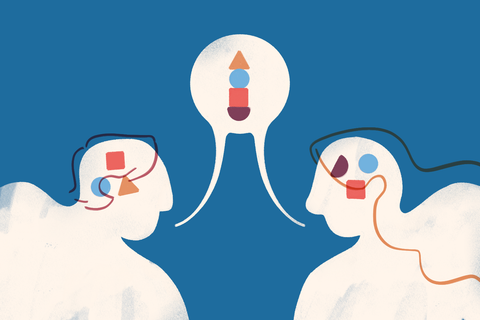From an early age, we are be bombarded with messages about how we should express our gender.
Men are often taught that they should be assertive, dominant, and sexually aggressive, while women are expected to be passive, nurturing, and submissive. People who are non-binary, trans, or do not fit within the standard ‘gender binary’ may struggle even more with these messages, finding it difficult to see themselves represented within the societal view of what gender is and how it should look.
Gender stereotypes can feel uncomfortable, and leave many people unhappy with the role they might feel expected to play in a relationship. As a result, authentic communication about desires and boundaries can become compromised, potentially hindering a healthy and satisfying sex life.
Today we’re going to look at some of the more frequent gender stereotypes, how they can impact our romantic lives, and how we can counter them.
STEREOTYPE: Men want sex, and women want relationships.
REALITY: It’s complicated.
There’s a common stereotype that says men are only interested in having sex, while women want a relationship and don’t have a strong interest in sex. The assumption is that men might enter into a relationship just to have sex, while women will have sex as long as it leads to a relationship. We think this doesn’t sound like a lot of fun for anyone!
Of course, there will be people of all genders who, at some point in their lives, are looking for some no-strings-attached sex. And there’ll also be people of all genders who are seeking relationships. This is totally normal, and it makes sense that people have their own desires and wants in relationships.
However, it’s not fair to assume that all men are exclusively interested in sex, and all women are exclusively after a relationship. There are, no doubt, men out there looking for committed relationships, and women seeking only sex—and people who don’t fit within that binary looking for either, both, or something else completely! We think that the kind of connections we desire are influenced more by the goals and dreams we have for ourselves, rather than simply our gender.
STEREOTYPE: It’s easy for someone with a penis to orgasm, but really complicated for someone with a vulva.
REALITY: Bodies of all genders can have different sexual responses.
We’ve all seen or heard the jokes about how people with a penis find it so easy to climax, in comparison to people with a vulva.
We think that this stereotype is actually really harmful, because its pervasiveness may mean that some people are less likely to want to try to help their partners climax if they have a vulva because they assume it will be too difficult—and similarly, people with a vulva may be led to assume that their orgasms are too tricky and not worth trying for.
Similarly, the assumption that people with a penis find it easy to orgasm can be harmful to people with a penis, because if they ever have difficulty climaxing they may assume that there’s something ‘wrong’ with them—when really, their body might just be taking a little longer than usual that day.
The truth is that everyone’s body is different. Some people can climax easily, others take a little longer, and for many people, their mood and how their body is feeling on any given day can impact their orgasm. We think the key to a quality O is lots of foreplay and experimenting until you find what you enjoy!
STEREOTYPE: Women desire emotional intimacy, but men don’t.
REALITY: We all deserve to have our emotional needs taken seriously.
We’ve seen it in films and TV shows all the time: immediately after sex, the man rolls over in bed and falls asleep while the woman is left awake, wishing that she could cuddle or talk with her partner. The implication is that she has unmet emotional needs, while the man has no emotional needs at all.
This, of course, isn’t true. People of all genders have rich emotional needs, and people of all genders can want to cuddle and talk and be held after sex. This stereotype can be harmful because it assumes that men do not have emotions—that, of course, is not true—and that women’s emotions can be fraught and something that a partner needs to ‘handle’ in order to have sex with her. This can lead people of all genders to feel like they need to bottle up their emotions and hide their needs from their partner, rather than expressing them and allowing themselves to be vulnerable.
We think that those moments after sex are a great time to be emotionally intimate with your partner, regardless of gender. Have a cuddle, talk, share a laugh, or just enjoy each other’s company—and, of course, if you both want to roll over and fall asleep, that’s okay too.
STEREOTYPE: Men should take the lead in dating and relationships, and women should follow.
REALITY: We should do what makes sense and feels right for us.
We’ve come a long way from the belief that men are the head of the household, but the idea that men are somehow ‘in charge’ of the relationship, or leading the way, still survives. After all, it wasn’t that long ago that The Rules declared a woman should never text a man first, and we often still subscribe to the belief that a man should propose marriage to a woman, and never the other way around.
We think it makes sense to behave in a way that suits you, and your own relationship, rather than following outdated ideals of who should do what according to their gender. If it feels right for you to wait for that cute person to text you, rather than texting them first, then go for it—but keep your mind open to all possibilities. Why not be the one to make the first move?
We also think this stereotype is interesting because it shows how many dating and relationship norms are reliant upon ideas of heteronormativity. So many relationship dynamics and milestones have been crafted with the idea of a heterosexual couple in mind—it’s important to remember that as these ideals change and evolve, so too can our beliefs about gender and gender roles.






